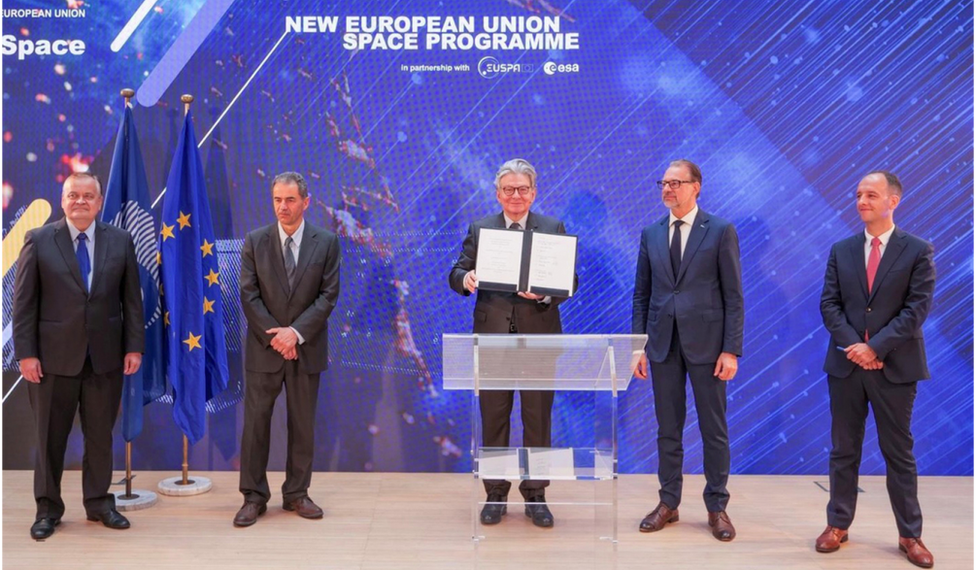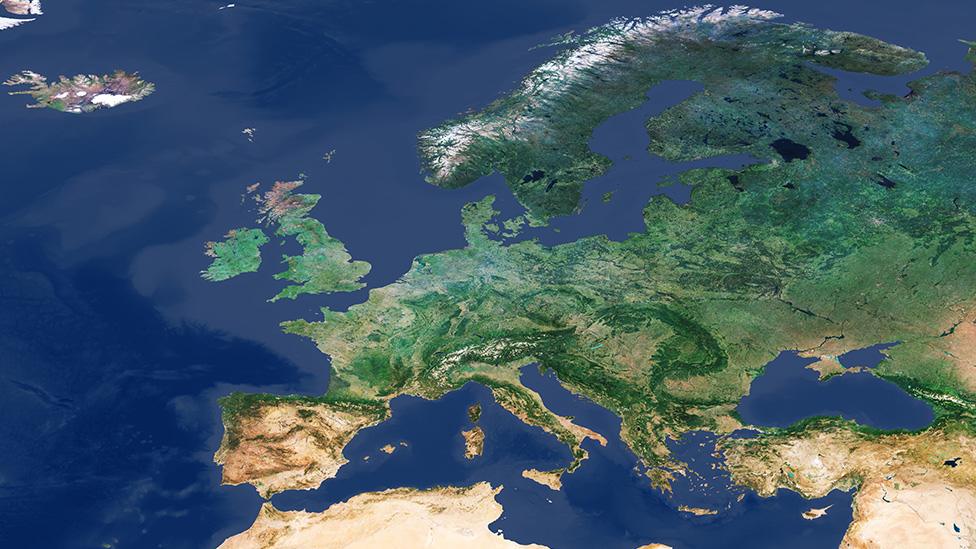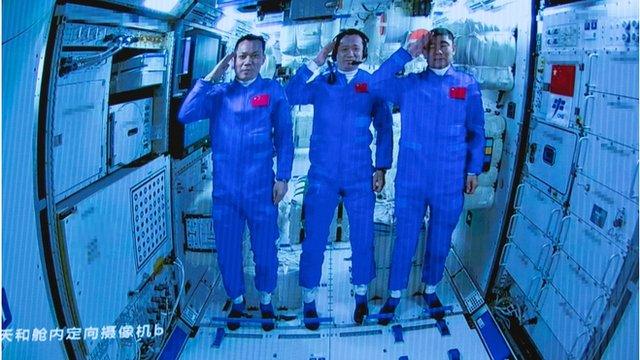Lift-off for European Union's new space programme
- Published

Thierry Breton (Centre) and Josef Aschbacher (second from right) have a new partnership agreement
The new EU space programme has been officially launched.
It'll cover the period to 2027 and will see the bloc's 27 member states deepen investments, external in satellite-navigation, Earth observation, space situational awareness and secure communications, among other activities.
It also establishes a new body called the EU Agency for the Space Programme, external.
Euspa will have oversight of everything the European Union does as a bloc in orbit.
Another key advance in the new programme is the nature of the EU's relationship with the European Space Agency (Esa).
The pair are separate entities with national memberships that don't completely overlap - for example, the UK is in Esa but not in the EU, and therefore not in Euspa. But the EU uses Esa as its technical adviser and industrial procurement agent.
The legalistic underpinning of this "marriage" has now been put on a formal footing in the guise of a Financial Framework Partnership Agreement (FFPA).
The FFPA defines responsibilities and details the amount of money that will pass directly from the EU to ESA up to 2027 - some €9bn (£8bn; $11bn) out of a total EU space budget of €14.88bn. (The EU now funds a quarter of all Esa activities.)

The EU and Esa are separate legal entities whose memberships are not identical
EU funding during the coming period will help develop a next generation of Europe's satellite-navigation system, Galileo, and extend the scope and capabilities of its Copernicus-Sentinel spacecraft, which monitor the state of the planet.
But in launching the new programme, Thierry Breton, commissioner for the internal market, stressed the need for Europe to become more agile.
"Space is going through massive transformation and rapid industrialisation, all around the world," he said.
"For Europe to maintain its leadership, we must rethink the way we do space in Europe. We must adapt to fast developments and anticipate new ones.
"We must set an ambitious - and disruptive - space agenda for the future: Be more dynamic, more innovative, more risk-taking!"
The worry is that Europe is falling behind more fleet-of-foot entrepreneurs in the US, as well as the financial muscle that China is able to put behind its space programme.

China can launch its own astronauts to its own space station - Europe cannot
Josef Aschbacher, the director general of Esa, said: "We all know that in the US, the public spending is about five, six, seven times as large as in Europe; and the private spending is enormous. In 2019, the private sector (in the US) put $5bn into space. In Europe, in start-ups and SMEs, it was $188m. So a fraction of [what it was in the US].
"China, as we all see in the news, is investing enormously. We've just witnessed three [astronauts] going to their own space station on their own rocket. And it makes me reflect - what does Europe want to achieve?"
Dr Aschbacher has proposed, along with Mr Breton, that a special summit be convened next year to try to establish the true level of ambition in Europe. What does it want to do and is it prepared to pay what it costs?
The FFPA between the European Commission and Esa was negotiated over recent months. Tuesday's signature became possible only after all the agency's member states had approved the agreement's contents.
These nations included those, such as the UK, who are not in the EU.

The UK is no longer in the EU's Galileo sat-nav project, but it would like to continue in Copernicus
Britain voted through the document at Esa's council last week, but only after two red lines were respected.
The first concerned job discrimination within Esa. UK nationals cannot be prevented from working on EU-funded projects at the agency, except where the work relates to the most sensitive security aspects of those projects.
And the second red line touched on intellectual property developed through R&D at Esa. If the EU wants primacy over that IP, it must state its interest right at the outset of a project. The UK does not want to fund innovations which it is then prevented from exploiting.
There's a danger that security exclusions, and how tightly they are drawn, could become an area of increasing friction between the UK and the EU.
If already sour relations deteriorate further, it's not impossible that we could see future British directors at Esa being asked to "step out of the room" when sensitive security matters of interest to the EU are being discussed.
Much will depend on the protocols now being developed by the EU and the UK as part of their beyond-Brexit relationship.
Britain wishes to continue participation in some EU programmes, including Copernicus and the science research framework known as HorizonEU, which includes a number of space-related activities.
The size of the UK's "subscription" to these programmes has been set, but the fine detail of governance has not.
It is, however, vital to both sides that talks reach a satisfactory outcome.
Taking Copernicus as an example. The EU needs the UK's expected subscription of about €800m up to 2027 in order to fully implement plans for six new Earth observation satellite systems. And the UK, which does not possess a sovereign, multi-sensor satellite fleet of its own, can ill afford to be locked out of a capability it helped develop and fund in the years that it was an EU member.
